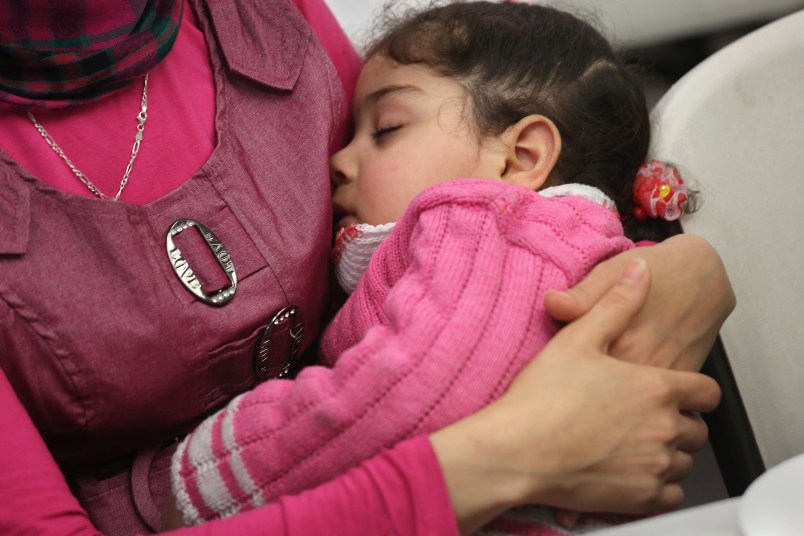The Trump administration has a response to the recent revelation that the government lost track of nearly 1,500 undocumented minors: more detention centers, quicker deportations, and more intrusive vetting for sponsors who sign up to act as fosters for the so-called “unaccompanied alien children,” or UACs.
Officials on a press call Tuesday — representing the Department of Justice, the Department of Homeland Security and the Department of Health and Human Services, a subagency of which is responsible for finding temporary homes for unaccompanied migrant kids — mostly dismissed concerns about the fallout from such a hardline approach.
For example, the officials referenced an upcoming agreement between DHS and HHS requiring sponsors for the children to submit to a fingerprint-based background check.
NBC News’ Julia Ainsley noted that the move could discourage undocumented parents from applying to take custody of their children, given their reasonable fear of potentially handing information over to the agency that also houses Immigration and Customs Enforcement. Parents who balk at giving their fingerprints to the government could be forced to leave their children in long-term foster care.
“If somebody is unwilling to claim their child from custody because they’re concerned about their own immigration status, I think that, de facto, calls into question whether they’re an adequate sponsor and whether we should be releasing a child to that person,” said Steven Wagner, the acting assistant secretary for the Administration for Children and Families at HHS.
The same agreement would make it easier to prevent unaccompanied minors from entering the “general population,” in Wagner’s words, if they had a known gang affiliation. Pinning down such affiliations, though, has proven difficult and prone to abuse by government officials.
“We’re really looking forward to the implementation of this MOA so DHS helps us to our job even more effectively,” Wagner said.
He also criticized much of the reporting on 1,475 “missing” undocumented immigrant kids residing with American sponsors, saying that the term was “inaccurate” and that the number reflected those whose sponsors didn’t answer HHS’ check-up phone calls. The story arose out of Wagner’s own testimony to Congress last month.
“If you call a friend and they don’t answer the phone, you don’t assume that they’ve been kidnapped,” he said Tuesday.
Separately, senior Trump adviser Stephen Miller expressed the administration’s desire to eliminate a slew of regulations, some implemented by courts, that apply to undocumented immigrant children.
The Flores Settlement, for example, prevents the long-term detention of undocumented immigrant children. It’s the reason that the new Trump administration policy of criminally prosecuting illegal border crossers will result in children being separated from their parents, even if they are arrested together.
Rather than returning to the status quo of trying such cases in civil courts, Miller argued that children should be put in long-term detention, as well. He also advocated for increased construction of detention facilities, to accommodate the existing shortage of beds for undocumented people in the government’s custody.
“The [Flores] settlement prevents a family unit from being detained together past a certain period of time,” he said. “The point is, the administration has said, we would like to terminate or modify the Flores settlement agreement, and also to fund detention space sufficient to maintain the entire the entire family unit together in continuous custody until their removal,” unless they qualify for certain immigration relief like asylum, he said.
Miller also argued that the government should be allowed to treat migrants from Central America just as it does those from Mexico and Canada — that is, able to be deported quickly rather than after waiting for a formal hearing, as required by a 2008 law.
“We need to change the law so families arriving illegally can be sent home swiftly, and so there can be an actual border protecting the country, and protecting American communities,” he said.







Jesus! These guys are losing their mojo! The correct answer, of course, is to give the immigrant kids guns…
“If you call a friend and they don’t answer the phone, you don’t assume that they’ve been kidnapped,” he said Tuesday.
It’s kinda telling that they arrived at that “unaccounted-for” number by supposedly making one single phone call, no followups, no visits. They really don’t care what happens to these kids at all.
This kerfuffle seems ripe with hypocrisy. Most adults I know wish children would get lost. Yet we fault Trumpco for actually doing it.
This is terrifying, because it’s supposed to be terrifying. “Don’t come here. We’ll take your kids and lose them.”